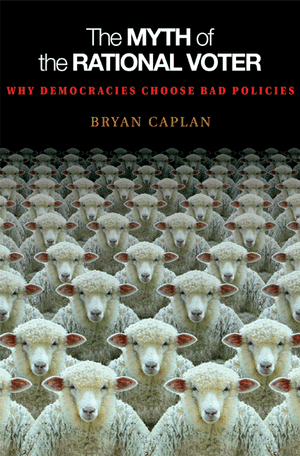In Praise of the Study of Folly
- Response 1: Defend the accused policies on their merits.
- Response 2: Argue that politicians and special interests have subverted democracy.
- Response 3: Explain how policies can be both popular and counterproductive.
Response 1 is rarely convincing. We would laugh if a professor spent hours poring over a failing exam scrawled in crayon, searching for its elusive wisdom. Why should we take the effort to rationalize misguided policies any more seriously? Their typical proponent has no subtle counterarguments. Most cannot state the experts' main objections, much less answer them.
 Response 2 is more intellectually satisfying. A policy with negative overall effects can still have big benefits for a small minority. But in spite of the academic attention this explanation has accumulated in recent decades, it suffers from two great flaws. First: Theoretically, there are many ways for the majority to cheaply reassert its dominance. Second: Empirical public opinion research shows that the status quo--including and perhaps especially its counterproductive policies--enjoys broad popular support, and that politicians respond to changes in public opinion.
Response 2 is more intellectually satisfying. A policy with negative overall effects can still have big benefits for a small minority. But in spite of the academic attention this explanation has accumulated in recent decades, it suffers from two great flaws. First: Theoretically, there are many ways for the majority to cheaply reassert its dominance. Second: Empirical public opinion research shows that the status quo--including and perhaps especially its counterproductive policies--enjoys broad popular support, and that politicians respond to changes in public opinion.
These facts have led me to response 3. Yes, it seems paradoxical for policies to be popular yet counterproductive. Common sense tells us that people like the policies that work the best. Economic training reinforces this presumption by analogizing democratic participation to market consumption: If the policy is so bad, why do voters keep putting it in their shopping cart?
But on closer examination, the paradox fades away. The analogy between voting and shopping is false: Democracy is a commons not a market. Individual voters do not"buy" policies with votes. Rather they toss their vote into a big common pool. The social outcome depends on the pool's average content.
In common-pool situations, economists usually fear the worst. Heedless of the aggregate effect, people will foul the waters. The main reason that they are complacent about democracy, I suspect, is that the pollution is hard to visualize. It is not run-of-the-mill physical pollution. Democracy suffers from a more abstract externality: the mental pollution of systematically biased beliefs. While economists rarely discuss the consumption value of beliefs, the idea is intuitively plausible and theoretically unobjectionable. Anything can be a"good," as far as economic theory is concerned. Daily experience tells us that one of the goods people care about is their worldview. Few of us relish finding out that our religious or political convictions are in error.
Once you grant this point, you only need to combine it with elementary consumer theory to get my model of rational irrationality. The quantity of irrationality demanded, like the quantity of pears demanded, decreases as its material price goes up. As is often the case in economics, however, this mundane assumption raises uncomfortable questions. In daily life, reality gives us material incentives to restrain our irrationality. But what incentive do we have to think rationally about politics?
Almost none. To threaten,"You will get bad policies unless you are rational" is a fallacy of composition. Democracy lets the individual enjoy the psychological benefits of irrational beliefs at no cost to himself. This of course does not deny the value of psychological benefits. But the trade-off is not socially optimal; democracy overemphasizes citizens' psychological payoffs at the expense of their material standard of living.
Migration patterns provide a nice illustration. Citizens of poor countries are often eager to emigrate to rich countries. But they rarely vote for parties that pledge to copy the policies of the rich countries. If an Indian desperately wants to move to the United States but is unable to get a visa, voting to make India more like the United States seems like the next best thing. But there is a crucial difference between the two actions. A migrant who leaves his homeland gives up psychological benefits, such as the belief that his nation is the best in the world, in exchange for a big jump in his material well-being. A voter who turns his back on his nation's political tradition gives up psychological benefits but--since policy is beyond his control--is not a penny richer.
Copyright Bryan Caplan
